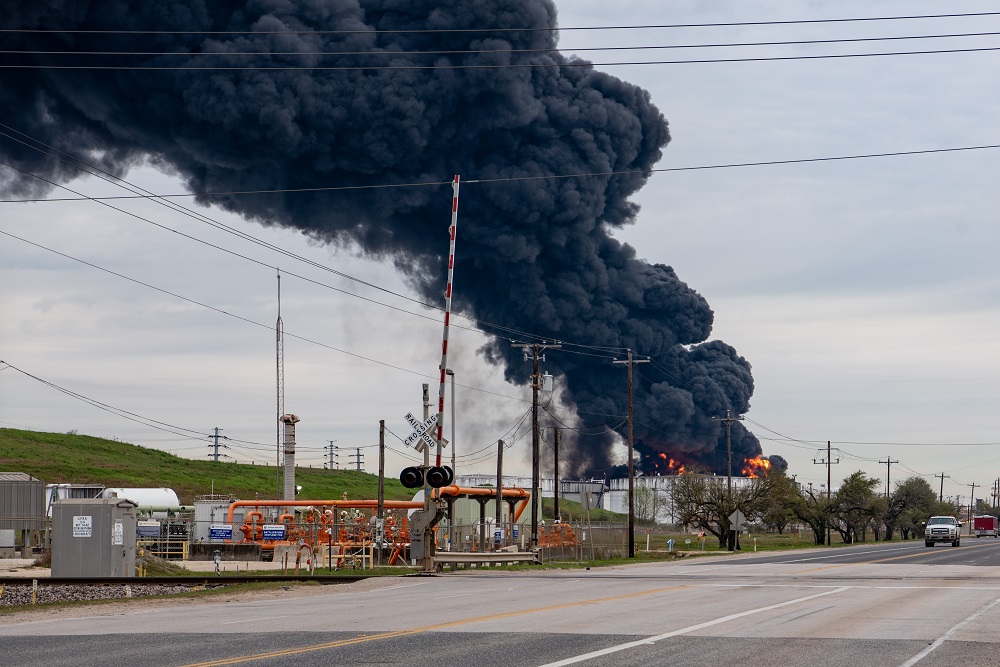Traffic through the Houston Ship Channel remains backlogged following a three day chemical fire at Intercontinental Terminal Co.s Deer Park, Texas, terminal last week.
ITCs terminal remains closed, but industry sources said the impact of the incident extends beyond that facility.

Photo: Veronika Vaneckova/Shutterstock
Flames and smoke coming from the Intercontinental Terminals Co. terminal in Deer Park, Texas on March 18.
The shutdown of the traffic on the ship channel has caused considerable upset to the normally busy traffic of base oil in and out of other terminals, notably the Vopak terminal right next door to ITC, said Joe Rousmaniere, director of business development at Chemlube International, a base oil trader and distributor.
The terminal has 231 tanks storing base stocks as well as a variety of other chemicals, fuels and feedstocks. The fire involved eight tanks which collapsed, but several other tanks were impacted by the fire. Those tanks impacted by the fire include two that store base oil for SK Lubricants Americas. SK advised, though, that its ability to supply customers has not been impacted because it also has inventories stored in other locations.
SKs overall local storage capacity is sufficient without the impacted tanks, SK Lubricants Americas Vice President of Sales Beth Fields said in an interview.
ITC has not commented on the origin of the blaze but told Lube Report it is investigating the cause. The company declared force majeure, a legal statement that it is unable to meet contractual obligations due to events beyond its control. It did not respond to questions about that declaration or state whether it applied to all materials stored at Deer Park.
The fire was first reported at 10:22 am March 17. Initially it involved tanks storing naphtha, but by early the next morning it had spread to involve a total of eight tanks holding materials that included base oils, xylene, gasoline blend stocks and toluene.
Despite efforts to put the fire out, the flames intensified and spread to two more tanks containing pyrolysis gasoline March 19 between 4 p.m. and 10 p.m., thanks to a temporary reduction in water pressure due to the malfunction of two fireboat pumps, according to statements by ITC. By 3 a.m. on March 20, the blaze was extinguished.
Some tanks reignited March 22, likely as a result of the intense heat remaining, but the flames were put out an hour later and the facility has since been fire-free.
To help avoid further mishap, ITC pumped out the contents of some tanks, but not those containing base oil, which was deemed less of a threat because it is less volatile than other chemicals and therefore did not pose a threat of air emissions. These tanks are among the least impacted and remain standing, said Fields.
ITC Incident Commander Bruce Weber said during a press conference, Tank 80-11 is full, but its lube oil so its not any mission concern whatsoever. Theres no emissions.
The ship channel was partially closed March 22 after foam and chemical product breached the secondary containment wall surrounding the western tank farm to enter a ditch running parallel to the channel. As a precautionary measure the Coast Guard shut down a portion of the Houston ship channel between Dow (Tucker Bayou) and the San Jacinto Monument to Crystal Bay.
The U.S. Coast Guard Sector Waterways Management office announced Monday that it would allow the limited opening of the San Jacinto River during daylight, and the resumption of cargo operations. With the exception of coordinated vessel movements by the Coast Guard, Old River and the channel remain closed to traffic between Tucker Bayou and Houston Ship Channel Light 116.
Thanks to semi-closure of the Houston Ship Channel, and the resulting risk of further explosions through vapor release, trading through this channel has halted for the time being, according to this weeks SSY Base Oil Shipping Report by Adrian Brown.
Some base oil suppliers are choosing to bypass the channel to avoid the negative impacts the closure may have.
Yesterday the Harris County Commissioners Court authorized the county attorney to sue ITC for failing to prevent the fire and subsequent chemical leak, according to several local reports. The county will demand TLC pay for government response costs associated with the fire, including, but not limited to, air and water motoring tests.